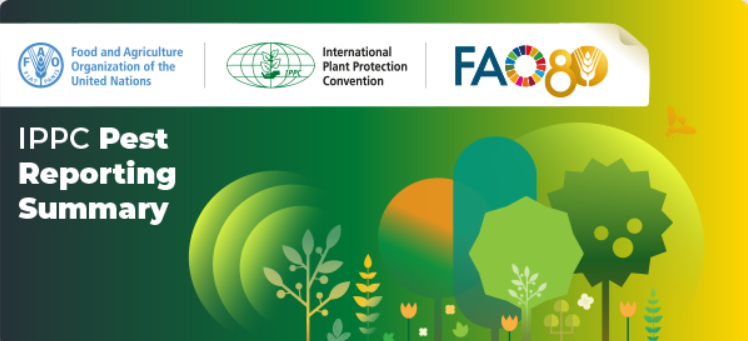IPPC Monthly Pest Reporting Summary – October 2025

Pest reporting is a key component of the National Reporting Obligations (NROs) under the International Plant Protection Convention (IPPC). Prompt and transparent sharing of pest information helps prevent the introduction and spread of quarantine pests worldwide. Many countries meet these obligations through the International Phytosanitary Portal (IPP) and others through national or regional web-based systems. If your country uses such a system, we encourage you to inform the IPPC Secretariat.
Key Pest Reports for October 2025
| Title | Summary | Country | Link to report |
|---|---|---|---|
| Detection of Pomovirus solani Potato mop-top virus, PMTV in potato | Pomovirus solani (Potato mop-top virus, PMTV) was detected in Tasmania, Australia. PMTV is not present in mainland Australia. | Australian | Here |
| Detection of Asian Citrus Psyllid - Diaphorina citri (Update) | Diaphorina citri Kuwayama (Hemiptera: Liviidae) is the primary vector of the citrus greening bacterium ‘Candidatus Liberibacter asiaticus’ (CLas), the pathogen responsible for huanglongbing (HLB)—the most devastating citrus disease worldwide. A targeted survey was carried out around the Koronivia area, including FNU-CAFF and the Koronivia Research Station. Collected samples were morphologically identified as Asian Citrus Psyllid (ACP), and molecular analyses further confirmed their identity as Diaphorina citri. Molecular identification results showed a 100% similarity match across all databases used: BOLD, NCBI BLAST, and Geneious. | Fiji | Here |
Note: This summary covers reports received through 30 October 2025.
Pest Alerts and Emerging Pests
The IPPC’s Pest Outbreak and Alert Response System (POARS) includes pest alerts and information about emerging pest threats. For more details, visit: Pest Outbreak Alert and Response System (POARS) - International Plant Protection Convention
The POARS Steering Group has finalized the assessments of nominated pests — stay tuned for the upcoming alerts on Emerging Pests and the updated pest on the Watch List
An open call for nominating potential emerging pests will remain available. For details and instructions, please visit the POARS site.
Enhancing pest reporting collaboration
Individual efforts by each country collectively drive the actions needed to safeguard global plant health. We encourage NPPOs to continue their reporting efforts through the IPP by logging in as Official Contant Point (OCP), navigating to the country page dashboard, providing the necessary information, and submitting the pest report.
If your NPPO uses a different platform or national system to report pest outbreaks, please inform the IPPC Secretariat by writing to [email protected] and copying [email protected].
Capacity development opportunity
Ready to level up your expertise and stay ahead in the fight against plant pests?
The IPPC Plant Health Campus is your dynamic hub for interactive learning, expert resources, and practical training tailored to plant health professionals worldwide. Dive into high-impact content — from pest diagnostics and biosecurity to surveillance and National Reporting Obligations (NROs) - and strengthen national, regional, and global plant health capacity. Now available in English and French — with Spanish coming soon!
Stay informed
Our following monthly summary will be available in November 2025. Meanwhile, visit theReporting System - International Plant Protection Convention for real-time updates and detailed pest reports.
Countries by Region
Key Links & Documents
- IPPC Monthly Pest Reporting Summary – October 2025
- Model Instrument for Adherence to the IPPC
- IPP Editor - Nomination Request for NPPOs
- Role of the IPPC Official Contact Points
- IPPC Official Contact Point notification form
- National Pest Reporting through Regional Plant Protection Organizations
- National & Regional Summary Statistics
- National Reporting Obligations Guide

